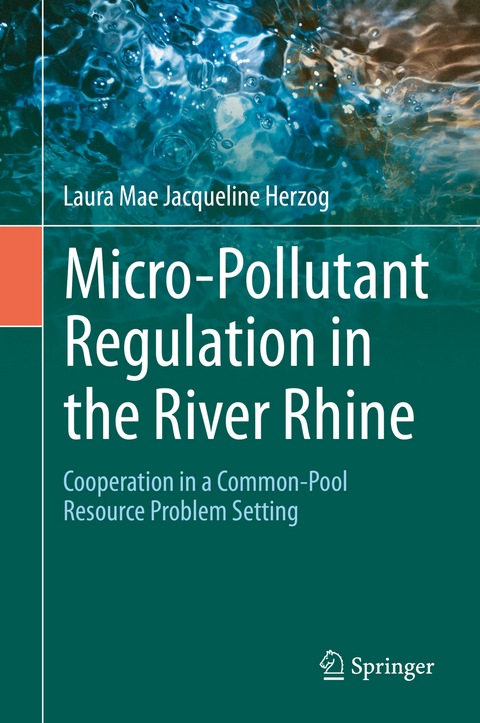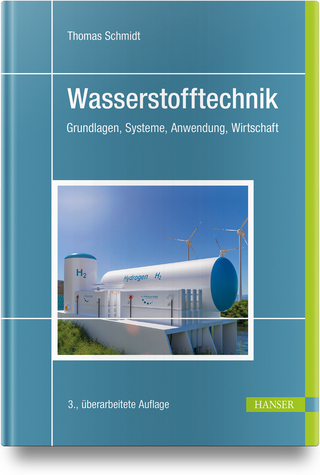
Micro-Pollutant Regulation in the River Rhine
Springer International Publishing (Verlag)
978-3-030-36769-5 (ISBN)
This book investigates how actors organize in order to solve a water quality problem. Research on the use of environmental resources has mainly focused on the circumstances needed for users to self-organize or to maintain an already sustainable way of resource use. Few studies have investigated the reasons why actors start to cooperate when they are faced with an environmental problem. Actor networks in three regions of the Rhine catchment area are scrutinized regarding a) actors' cooperation pattern when managing an environmental problem; and b) the factors that trigger actors in a common-pool resource situation to initiate cooperation. Water quality policy is analysed in two European countries - Germany and Luxembourg - and one non-European country - Switzerland -, providing an overview of the distinctive measures applied in these regions aiming to tackle the water quality problem of micro-pollutants in river surface water. Applying the social-ecological system framework (SESF) devised by E. Ostrom and her colleagues and Social Network Analysis (SNA), the current book combines qualitative and quantitative methods to answer the question of why actors cooperate in the management process of an environmental problem like water pollution.
Laura Mae J. Herzog is a postdoctoral fellow at the Chair of Resource Management (Prof. Dr. Claudia Pahl-Wostl) at the Institute of Environmental Systems Research at the University of Osnabrück. She is interested in the different uses and the sustainable management of common-pool resources (CPR), in particular the common-pool resources water and land. In her research, she investigates the interactions of humans with water and land resources as well as the influences of these interactions on the respective ecological system and the potential conflicts of interest emerging from such. She is interested in how such influences on nature can be shaped sustainably and how resource conflicts can be moderated and resolved. Taking into account the respective institutional framework, i.e. the laws and regulations that influence water and land management, and the state of the respective human-influenced ecosystem, Laura Herzog pursues an interdisciplinary approach, looking at the socio-ecological systems she examines from a socioscientific as well as a natural scientific perspective.
Contents
Abbreviations
Illustrations
Tables
Annexes
Illustrations in the Annex
Tables in the Annex
Acknowledgements
Synopsis
- Introduction
1.1 The CPR and the policy problem of micro-pollutants in surface water
1.2 Defining the key terms: management process, collaboration & cooperation
1.3 Theoretical background, methodological approach & findings
1.4 Societal relevance of the research
1.5 Structure of the dissertation
2. Literature Review
2.1 Theories of non-cooperation
2.1.1 The prisoner's dilemma-a non-cooperative, nonzero-sum game
2.1.2 The tragedy of the commons
2.1.3 The theory of collective inaction
2.2 Theoretical concepts on collective action and common-pool resources
2.2.1 A theoretical concept of cooperation's core relationships
2.2.2 Preconditions for collective action in CPR settings
2.2.3 The IAD framework-an analytical tool to assess collective action
2.3 Governance and cooperation
2.3.1 A typology of the governance concept
2.3.2 Environmental and collaborative governance
3. Theory & Hypotheses
3.1 A first driver for cooperation-recognizing the environmental problem
3.2 A second driver for cooperation-forums
3.3 A third driver for cooperation-actors' shared beliefs
3.4 Theoretical relevance of the research
4. Research Design
4.1 Public policy analysis
4.1.1 The policy-making process
4.1.2 The policy problem
4.1.3 The solutions to a policy problem
4.1.4 Policy networks
4.2 The conceptual framework guiding the research design
4.2.1 The Social-Ecological System framework (SESF)
4.2.2 Critique of the SESF
4.3 Operationalization of the dependent and independent variables along the
SESF
4.3.1 The dependent variable cooperation
4.3.2 The independent variables
4.3.3 The control variables
4.4 Case study selection criteria & case study design
4.4.1 The case study selection criteria
4.4.2 A within- and across-unit case study design
4.5 Presentation of the three case studies
4.5.1 The micro-pollutant management process at the Rhine basin at Basel
4.5.2 The micro-pollutant management process in the Ruhr region
4.5.3 The micro-pollutant management process in the Moselle basin
4.5.4 Similarities and differences between the case studies
4.6 The data gathering methods
4.6.1 Document analysis
4.6.2 Actor identification4.6.3 Expert interviews
4.6.4 The survey and the methodological operationalization of the variables
4.6.5 Response rates & handling missing data
4.7 The data analysis methods
4.7.1 Descriptive Social Network Analysis
4.7.2 Exponential random graph models
4.7.3 Qualitative Analysis-a case comparison
5. Analysis I: What Defines Cooperation?
5.1 The constituting elements of cooperation
5.1.1 Aiming towards the same goal
5.1.2 Coordinating each other's actions-actors' collaboration
5.1.3 Exchanging resources5.1.4 Relating the three elements
5.2 A network perspective on the main element of cooperation: collaboration
5.2.1 The macro-level: reciprocity, fragmentation & components
5.2.2 The meso-level: factions5.2.3 The micro-level: core, important, and peripheral actors
5.3 Actors' viewpoints on cooperation
5.3.1 ... in the Basel case study
5.3.2 ... in the Ruhr case study
5.3.3 ... in the Moselle case study
5.3.4 Summary of the actors' perspectives on cooperation
5.4 Comparison I: Cooperation across the cases
5.4.1 Different intensities of cooperation
5.4.2 The CPR management processses as types of governance
5.4.3 Cooperation at different stages
6. Analysis II: What Explains Collaboration at the Dyadic Level?
6.1 The ERGMs' goodness of fit
6.2 Presenting the ERGM results
6.3 Model robustness checks
7. Discussion: What Triggers Collaboration and Cooperation in a CPR Problem
Setting?
7.1 Discussion of the hypotheses
7.1.1 Hypotheses 1a & 1b: the impact of problem perception on cooperation
7.1.2 Hypotheses 2a & 2b: the impact of actors' participation in forums on cooperation7.1.3 Hypothesis 3: the impact of actors' shared beliefs on cooperation
7.1.4 The control variables: the impact of actors' attributes on cooperation
7.1.5 Summary of the discussion
7.2 Comparison II: Factors enhancing cooperation across the cases7.2.1 Problem perception as initial trigger (IV 1a)
7.2.2 Actors' similar viewpoint on the CPR problem (IV 1b)
7.2.3 Conclusion 1: The timing of actors' problem perception matters
7.2.4 Forums consolidating cooperation (IVs 2a & 2b)7.2.5 Forums' bridging and bonding capital (IVs 2a & 2b)
7.2.6 Conclusion 2: Forums reinforce cooperation in CPR problem situations
7.2.7 Conclusion 3: Shared beliefs (IV 3) make no difference
7.3 Summary of the case comparison
8. Conclusion
8.1 The findings-factors contributing to cooperation in a CPR problem setting
8.2 Explanatory strength of the results
8.3 Discussing the methods
8.4 Contributions to theory
Bibliography
Annex
| Erscheinungsdatum | 06.03.2020 |
|---|---|
| Zusatzinfo | XXV, 336 p. 65 illus., 54 illus. in color. |
| Verlagsort | Cham |
| Sprache | englisch |
| Maße | 155 x 235 mm |
| Gewicht | 703 g |
| Themenwelt | Naturwissenschaften ► Biologie ► Ökologie / Naturschutz |
| Naturwissenschaften ► Geowissenschaften | |
| Technik ► Umwelttechnik / Biotechnologie | |
| Schlagworte | Ecology of games framework (EFG) • Environmental Geography • Environmental politics • Over appropriation of environmental resurces • Pollution of resource surface water • social network analysis • Water Policy • Water pollution management • Water Quality and Water Pollution |
| ISBN-10 | 3-030-36769-X / 303036769X |
| ISBN-13 | 978-3-030-36769-5 / 9783030367695 |
| Zustand | Neuware |
| Informationen gemäß Produktsicherheitsverordnung (GPSR) | |
| Haben Sie eine Frage zum Produkt? |
aus dem Bereich


